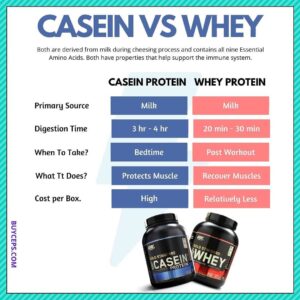Casein protein is a slow-digesting, milk-derived protein that constitutes about 80% of the protein content in cow’s milk. Known for its distinctive white colour, casein is found in various dairy products, including yoghurt, cheese, and infant formula. It’s a popular choice among athletes, bodybuilders, and those seeking long-term muscle repair due to its unique properties. Unlike casein peptides, which are broken-down fragments of the protein, casein in its natural form provides sustained nutrition, making it ideal for muscle growth, recovery, and overall health.
What Makes Casein Special?
One of the key characteristics that set casein apart from other proteins, such as whey, is its slow digestion rate. While whey protein is rapidly absorbed by the body, casein releases amino acids gradually over time. This slow-release feature makes it a perfect option for muscle development, repair, and recovery over several hours. Casein’s prolonged digestion is especially beneficial when consumed before bed or during long fasting periods, as it continues to supply the body with essential nutrients throughout the night or between meals.
How Does Casein Work?
When consumed, casein forms a gel-like substance in the stomach, which significantly slows down its digestion. As a result, it delivers a steady supply of amino acids, the building blocks necessary for muscle repair and growth. This slow and steady release makes casein highly effective at promoting muscle protein synthesis over a prolonged period. Additionally, because of its ability to increase feelings of fullness, casein can help curb hunger, making it a useful tool for those trying to manage their weight.
Casein vs. Whey Protein

The separation of casein and whey occurs naturally during the cheesemaking process. Casein forms solid curds, which can be processed into powders or used in products like cheese, while whey remains in liquid form. Both proteins are considered complete proteins, meaning they contain all nine essential amino acids necessary for muscle repair and growth.
Although both casein and whey are derived from cow’s milk, they serve different purposes due to their digestion rates. Whey protein is rapidly absorbed, making it ideal for post-workout recovery when muscles need immediate nutrients. In contrast, casein provides a prolonged release of amino acids, making it more suitable for periods of rest and recovery, such as overnight or during times when you’re unable to eat for an extended period.
Benefits and Uses of Casein Protein
Casein protein supplies the body with the essential amino acids needed for muscle development. A few of its benefits and uses are:
- Muscle Development and Recovery: Casein supplies all essential amino acids, providing a steady nutrient release that supports muscle repair and growth, especially during sleep or long fasting periods.
- Weight Management: Its slow-digesting nature increases feelings of fullness, helping to control calorie intake and prevent overeating, making it a great option for weight management.
- Bone Health: Rich in calcium and phosphorus, casein helps maintain strong bones and may reduce the risk of osteoporosis, particularly in older adults.
- Meal Replacement: Casein can serve as a convenient meal replacement, offering sustained nutrition that curbs hunger on busy days.
- Post-Workout Recovery: Casein’s slow release of amino acids supports muscle repair during rest periods, complementing whey protein’s fast absorption for long-term recovery.
- Weight Control: Helps in managing weight by promoting satiety and reducing overall calorie intake.
- Muscle Repair: A steady amino acid supply supports muscle recovery after exercise.
- Improved Sleep Quality: Consumed before bed, casein promotes muscle repair overnight, improving sleep quality for better recovery.
Potential Side Effects and Precautions
For most individuals, casein is a safe and beneficial supplement. However, there are a few considerations to keep in mind.
- Dairy allergies: People with milk allergies should avoid casein, as it may cause reactions like hives, chest tightness, or dizziness.
- Lactose intolerance: Those with lactose intolerance may tolerate casein-based foods like yoghurt or cheese, but should avoid casein if allergic to milk proteins.
- Overconsumption: Excessive intake may lead to weight gain or digestive discomfort.
- Moderation: Important to monitor intake based on overall calorie and nutritional needs.
Conclusion
Casein protein is a valuable dietary supplement that offers numerous benefits, especially for muscle growth, recovery, weight management, and bone health. Its slow-release properties make it an excellent choice for those looking to sustain muscle protein synthesis over an extended period. Whether consumed before bed, as a meal replacement, or after a workout, casein provides a versatile and effective solution for supporting overall health and wellness.
However, as with any supplement, it’s essential to use casein in moderation and consult with a healthcare professional if you have any concerns, particularly if you have a dairy allergy. When used appropriately, casein can be a powerful tool for achieving fitness goals and maintaining a balanced diet.
 Food Manifest
Food Manifest 


















